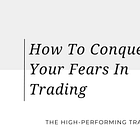When Being Right Gets in the Way of Trading Well
Consistency starts where the need to be right ends.
It’s the first Sunday of the month, which means I’m unlocking a paid post for everyone.
Want to have access to coaching tools, mental frameworks, and live webinars? Upgrade to paid to get the full experience:
The moment you enter a trade, one of two things happen:
You either stay grounded in the plan, or
Your mind gets attached to the P&L fluctuation inside the trade.
That’s the split between consistent traders and emotional ones.
Taking valid entries is one battle — when the trader no longer resorts to impulsivity — but staying grounded while the trade is running is one of the toughest parts of the business.
There are really two types of traders I’ve observed who bring two total different mindsets to their trades.
The predictor
The executor
In this post, we’ll go over each one to help you shift from the first to the second, where you achieve freedom of execution.
The Predictor
The Predictor’s biggest challenge isn’t overtrading. It’s over-explaining.
Their self-talk sounds like:
We wanna see bears right now
We need more buyers in…
Price will for sure retest this level if it wants to go up
And every time the market does the opposite or moves against them, they feel the urge to adjust their narrative to make sense of what’s happening instead of staying with their edge.
The dangerous part about this is that when you “want” to see something happen in the market, you miss the plan when it doesn’t. And when you are afraid of something happening, like a loss, then you’ll trade to avoid that fear. It’s an emotionally vulnerable place to be in.
The brain loves stories.
It’ll make up literally anything to explain why you won, why you lost, and what the market is doing.
When a loss happens, they search for meaning. When a win happens, they stop searching — because it feels good to be right.
And that’s how you deviate from pure execution to fitting the market into a “right or wrong” frame.
The moment you start narrating your winners, you’re tying your self-worth to short-term outcomes again and reinforcing the same emotional circuitry you’re trying to quiet down.
The antidote is detachment — not just from results, but from the analysis of results.
Stop searching for explanations. Focus on alignment: Did I follow my process or not?
That’s all that matters.
You don’t need a reason for why a trade won or lost. You only need a mirror to see how well you executed.
That’s why removing your P&L from daily view is an essential step. Look at it monthly or quarterly, never during your session.
When the numbers disappear, all that’s left to study is yourself. And that’s where growth begins.
The more you try to understand every candle, the further you drift from execution.
Your job is not to make sense of things. We think we have all the information to analyse the market, but we don’t; we’re just retail traders, so a lot of information is hidden behind the scenes. You’ll never know entirely why the market moved the way it did, nor do you need to know in order to make a profit out of it, as Mark Douglas said.
The Executor
The executor’s mindset is different. Here, you’re not trading within the frame of “right and wrong”. You go beyond that to simply react.
The self-talk of an executor sounds like:
“Is this confirming or invalidating my setup?”
“What level proves me wrong?”
“Does this still fit my plan?”
It’s not emotional — it’s neutral, curious, grounded.
The executor is not worried about what the market will do. They know their center is their process, and whatever happens, they have control over how/if they execute it. They’re in it with a total different goal than the predictor — the goal of collecting data and evaluating feedback.
That’s the essence of consistency: You trade one small hypothesis at a time, and let the market confirm or deny it.
It’s like a scientist running an experiment. You don’t force the result — you record it.
And you don’t change your entire system mid-trade because one candle made you uncomfortable.
This is what emotional regulation really looks like. Not the absence of emotion — but the ability to stay with uncertainty without reacting to it. The more you do it, the wider your tolerance to discomfort becomes.
It’s what neuroscientists call psychological flexibility — the prefrontal cortex staying online while the amygdala fires alerts in the background.
The executor also feels an impulse to control at times, but it’s less intense because of the perspective they hold: they know that impulse doesn’t need to be obeyed. This acknowledgment in itself significantly reduces your urge.
The Cost of Needing to Be Right
The need to be right is your brain trying to protect your ego from feeling uncertain or exposed.
That’s why it’s so dangerous — because it disguises itself as “analysis.”
The more you identify with being right, the more fragile you become when you’re wrong.
This reminds me of an interview where Kobe says:
If you play with the fear of failure or if you play with the will to win, it’s a weakness either way. Because if you play with the fear of failure you’ll have the pressure on yourself to capitulate to that fear. And if you play with the sense of “I wanna win, I wanna win” then you have the fear of what happens if you don’t. But if you find a common ground in the middle then it doesnt matter — you’re unphased by either — and that enbales you to stay in the moment and not feel anything other than what’s in front of you.
Trading doesn’t have to be a right-or-wrong game. You can detach part of your ego to it; it’s a skill, and it comes with experience.
When you stay within that frame, though, then you’ll keep repeating the same mistakes:
You close trades too soon just to avoid being wrong.
You flip directions mid-trade to regain control.
You overanalyze price action, trying to fix the narrative.
You widen targets to prove a point.
You take extra trades to “redeem” the last mistake.
Every one of these actions is the ego fighting for survival.
When you’re grounded in execution, those same moments look different.
You pause. You reassess. You breathe. You follow your plan.
You stay in the market’s rhythm instead of your own fear.
That’s the quiet difference between the trader who trades reality
and the one who trades identity.
One is gathering data, the other is gathering proof.
The Shift
Every session, you’ll face both voices — the Predictor and the Executor. And maintaining the Executor’s mindset isn’t a one-time decision. It’s ongoing.
It’s easy to start your morning with discipline and awareness. It’s much harder to stay there once you’re in a trade that tests your patience.
That’s where awareness of language becomes your anchor. Your self-talk isn’t random. It’s your subconscious trying to steer the wheel.
So before each trade — and during it — notice the words that come up. Are you describing what you want the market to do? Or are you observing what it’s actually doing?
In Closing
Trading reflects your relationship with uncertainty.
The Predictor seeks control. The Executor seeks information.
One is fueled by ego. The other by process.
You don’t have to eliminate the Predictor completely — it’s part of being human. But you can train yourself to recognize when it takes over
and shift back to execution.
You don’t need to know what is going to happen next to make money.
— Mark Douglas
Love,
Sara
Related Reads:





🙏❤️🔥
I really enjoyed this post Sara. There's an intoxication that comes from making a big return on a speculative hit. And I guess that's what keeps people coming back to the gambling tables in Vegas too. Today, I'm leaning more towards slow and steady over the long term definitely wins the race for me. My new method is based on that. Peace.